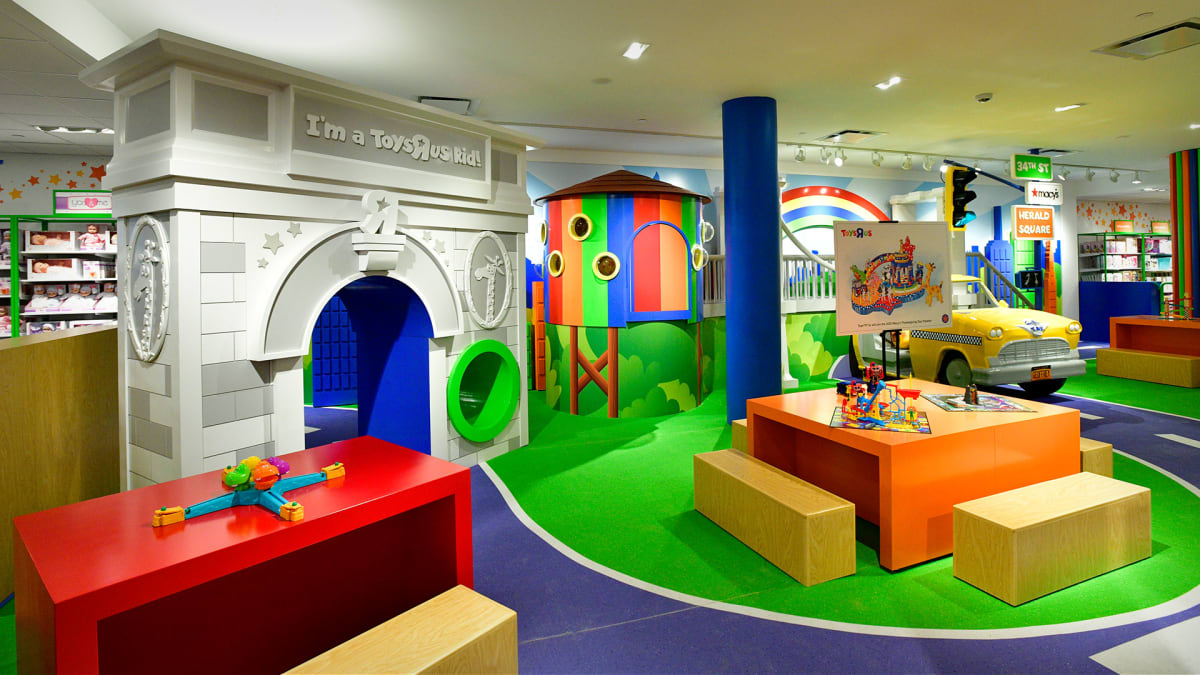
Will somebody just put that poor giraffe out of his misery?
Toys R Us, long symbolized by Geoffrey the Giraffe, has ceded its relevance years ago. Yet people still keep finding ways to squeeze one last drop of equity from a company whose mascot looks better suited hawking cheap cell phones outside a strip mall or fast food joint than entertaining kids.
The once ubiquitous toy retailer, which has passed through Wall Street, bankruptcy and private equity and back again, is now in the hands of something called WHP Global. Last month, the company, which also owns other has-been brands like Express and Anne Klein, received a $375 million investment from private equity firm Ares Management Corporation, a move that values WHP at $1.6 billion.
WHP Global thinks it can reinvent these brands for 21st century retail, through e-commerce, licensing, and global expansion. With Toys R Us, the company has already struck agreements to open Toys R Us stores inside Macy's Inc. (M) stores and create content for Nickelodeon's YouTube channel.
With all due respect to these very smart private equity folks, there’s a reason that Toys R Us has been through a revolving door of owners this century: the chain just couldn’t hack it against competitors like Amazon Inc. (AMZN), Walmart Stores Inc. (WMT) and Target Corporation (TGT).
This is Nostalgic Capitalism
There’s no shame to this. That’s how capitalism works. Whether competition or technological disruption or some combination of both, retailers have fallen by the wayside.
But through the magic of bankruptcy courts and deep pocketed financial investors, retailers that should have stayed dead, like Radio Shack, Sears, and J. Crew, find new life. (In the digital age, why anyone would want to buy something from a chain with words “radio” and “shack” in its name is beyond me.)
These financial investors “drain the life of a business model and move on,” said Brian Kelly, a former Sears executive and retail consultant. “They trade on a pre-existing identity and think they can squeeze a little more life out of [the] name.”
I understand the temptation. Retailers, probably more than other industries, command a powerful hold over older generations’ sense of nostalgia. You could say the same thing about daily newspapers. But no one is rushing to spend millions of dollars to keep resurrecting The Rocky Mountain News, Honolulu Star Bulletin, or Tampa Bay Tribune from oblivion.
Toy stores, however, are a different story. Nostalgia is built into the business model, childhood innocence at its purest. If you’re a certain age, who could forget Toys R Us’ “I don’t want to grow up, I’m a Toys R Us Kid” jingle? Or the sight of Tom Hanks playing chopsticks with his feet on the giant FAO Schwarz piano in the film Big.
Retail With No Soul
But nostalgia can only take a retailer so far. The emergence of the Internet and big box retailers wiped out “category killers” like Toys R Us, Circuit City, and Borders books.
There have been a few noteworthy attempts to bring back Toys R Us. In 2006, private equity giants Bain Capital Partners and Kohlberg Kravis Roberts & Company recruited Gerald Storch, a former vice-chairman of Target, to lead Toys R Us.
Sales gradually grew and there was talk of an IPO. In 2011, I spoke to Storch while he toured a new Toys R Us superstore in Minnetonka, Minnesota.
Despite the chain’s private equity ownership, Storch told me he was playing the long game with the retailer.
"We have a saying here, 'We play to win,'" Storch said at the time. "We're not playing defense. We're playing offense. We have a great brand. People have warm, positive feelings toward the brand. It would cost billions of dollars to build a brand like this from scratch."
But things fell apart. The IPO never happened and Toys R Us filed for bankruptcy in 2017.
I reconnected with Storch for this story. He wouldn’t tell me what happened but it didn’t sound good. He did note that the retailer, under his leadership, generated the highest level of cash flow and profit margins in its history.
I asked Storch about Toys R Us’ prospects now. He didn’t sound too optimistic. Toys R Us, he said, is no longer a toy store but rather a brand for people to rent or buy.
And that’s the inherent problem with financial players purchasing old brands.
Retail used to be about an entrepreneur/founder building a business from the ground up to solve specific problems with compelling stores and assortments, Kelly said. Now investors swap existing brands like they were baseball cards, each believing they can build enough value to convince another potential sucker to purchase it.
“There is no soul, no spiritual sense” in this model, Kelly said.
As for Toys R Us, time is running out. New generations of digital native kids won’t have any memory of the jingle or Geoffrey so there won’t be any more residual goodwill to trade on, Kelly said.
When that happens, perhaps we can finally put tired old Geoffrey to rest.







